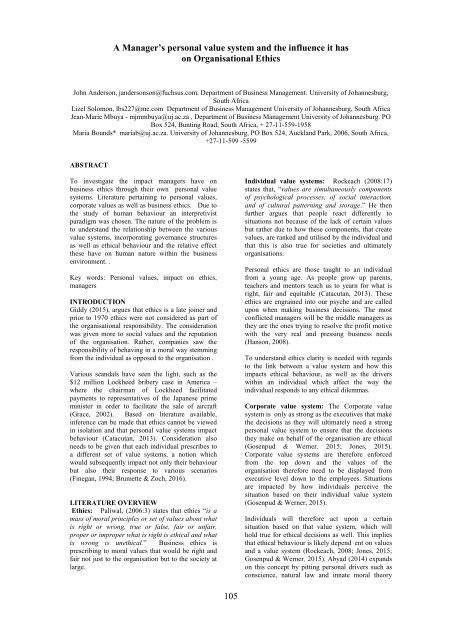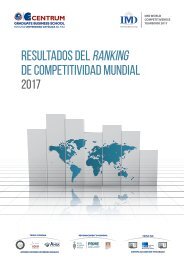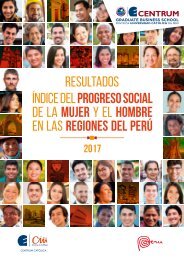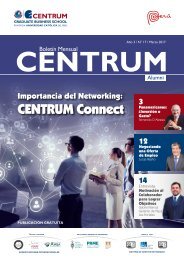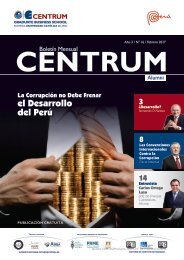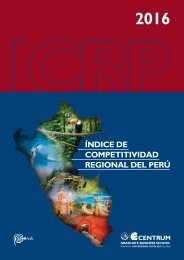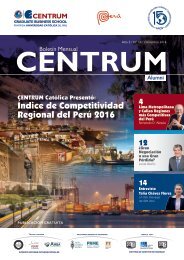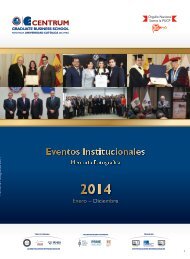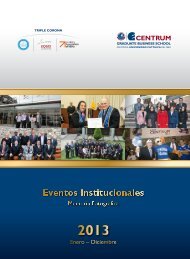Pan-Pacific Conference XXXIV. Designing New Business Models in Developing Economies
This publication represents the Proceedings of the 34th Annual Pan-Pacific Conference being held in Lima, Peru May 29-31, 2017. The Pan-Pacific Conference has served as an important forum for the exchange of ideas and information for promoting understanding and cooperation among the peoples of the world since 1984. Last year, we had a memorable conference in Miri, Malaysia, in cooperation with Curtin University Sarawak, under the theme of “Building a Smart Society through Innovation and Co-creation.” Professor Pauline Ho served as Chair of the Local Organizing Committee, with strong leadership support of Pro Vice-Chancellor Professor Jim Mienczakowski and Dean Jonathan Winterton.
This publication represents the Proceedings of the 34th Annual Pan-Pacific Conference being held in Lima, Peru May 29-31, 2017. The Pan-Pacific Conference has served as an important forum for the exchange of ideas and information for promoting understanding and cooperation among the peoples of the world since 1984. Last year, we had a memorable conference in Miri, Malaysia, in cooperation with Curtin University Sarawak, under the theme of “Building a Smart Society through Innovation and Co-creation.” Professor Pauline Ho served as Chair of the Local Organizing Committee, with strong leadership support of Pro Vice-Chancellor Professor Jim Mienczakowski and Dean Jonathan Winterton.
You also want an ePaper? Increase the reach of your titles
YUMPU automatically turns print PDFs into web optimized ePapers that Google loves.
A Manager’s personal value system and the <strong>in</strong>fluence it has<br />
on Organisational Ethics<br />
John Anderson, jandersonson@fuchsus.com. Department of <strong>Bus<strong>in</strong>ess</strong> Management. University of Johannesburg,<br />
South Africa<br />
Lizel Solomon, lbs227@me.com Department of <strong>Bus<strong>in</strong>ess</strong> Management University of Johannesburg, South Africa<br />
Jean-Marie Mbuya - mjmmbuya@uj.ac.za , Department of <strong>Bus<strong>in</strong>ess</strong> Management University of Johannesburg. PO<br />
Box 524, Bunt<strong>in</strong>g Road, South Africa, + 27-11-559-1958<br />
Maria Bounds* mariab@uj.ac.za. University of Johannesburg, PO Box 524, Auckland Park, 2006, South Africa,<br />
+27-11-599 -5599<br />
ABSTRACT<br />
To <strong>in</strong>vestigate the impact managers have on<br />
bus<strong>in</strong>ess ethics through their own personal value<br />
systems. Literature perta<strong>in</strong><strong>in</strong>g to personal values,<br />
corporate values as well as bus<strong>in</strong>ess ethics. Due to<br />
the study of human behaviour an <strong>in</strong>terpretivist<br />
paradigm was chosen. The nature of the problem is<br />
to understand the relationship between the various<br />
value systems, <strong>in</strong>corporat<strong>in</strong>g governance structures<br />
as well as ethical behaviour and the relative effect<br />
these have on human nature with<strong>in</strong> the bus<strong>in</strong>ess<br />
environment. .<br />
Key words: Personal values, impact on ethics,<br />
managers<br />
INTRODUCTION<br />
Giddy (2015), argues that ethics is a late jo<strong>in</strong>er and<br />
prior to 1970 ethics were not considered as part of<br />
the organisational responsibility. The consideration<br />
was given more to social values and the reputation<br />
of the organisation. Rather, companies saw the<br />
responsibility of behav<strong>in</strong>g <strong>in</strong> a moral way stemm<strong>in</strong>g<br />
from the <strong>in</strong>dividual as opposed to the organisation .<br />
Various scandals have seen the light, such as the<br />
$12 million Lockheed bribery case <strong>in</strong> America –<br />
where the chairman of Lockheed facilitated<br />
payments to representatives of the Japanese prime<br />
m<strong>in</strong>ister <strong>in</strong> order to facilitate the sale of aircraft<br />
(Grace, 2002). Based on literature available,<br />
<strong>in</strong>ference can be made that ethics cannot be viewed<br />
<strong>in</strong> isolation and that personal value systems impact<br />
behaviour (Catacutan, 2013). Consideration also<br />
needs to be given that each <strong>in</strong>dividual prescribes to<br />
a different set of value systems, a notion which<br />
would subsequently impact not only their behaviour<br />
but also their response to various scenarios<br />
(F<strong>in</strong>egan, 1994; Brumette & Zoch, 2016).<br />
LITERATURE OVERVIEW<br />
Ethics: Paliwal, (2006:3) states that ethics “is a<br />
mass of moral pr<strong>in</strong>ciples or set of values about what<br />
is right or wrong, true or false, fair or unfair,<br />
proper or improper what is right is ethical and what<br />
is wrong is unethical.” <strong>Bus<strong>in</strong>ess</strong> ethics is<br />
prescrib<strong>in</strong>g to moral values that would be right and<br />
fair not just to the organisation but to the society at<br />
large.<br />
Individual value systems: Rockeach (2008:17)<br />
states that, “values are simultaneously components<br />
of psychological processes, of social <strong>in</strong>teraction,<br />
and of cultural pattern<strong>in</strong>g and storage.” He then<br />
further argues that people react differently to<br />
situations not because of the lack of certa<strong>in</strong> values<br />
but rather due to how these components, that create<br />
values, are ranked and utilised by the <strong>in</strong>dividual and<br />
that this is also true for societies and ultimately<br />
organisations.<br />
Personal ethics are those taught to an <strong>in</strong>dividual<br />
from a young age. As people grow up parents,<br />
teachers and mentors teach us to yearn for what is<br />
right, fair and equitable (Catacutan, 2013). These<br />
ethics are engra<strong>in</strong>ed <strong>in</strong>to our psyche and are called<br />
upon when mak<strong>in</strong>g bus<strong>in</strong>ess decisions. The most<br />
conflicted managers will be the middle managers as<br />
they are the ones try<strong>in</strong>g to resolve the profit motive<br />
with the very real and press<strong>in</strong>g bus<strong>in</strong>ess needs<br />
(Hanson, 2008).<br />
To understand ethics clarity is needed with regards<br />
to the l<strong>in</strong>k between a value system and how this<br />
impacts ethical behaviour, as well as the drivers<br />
with<strong>in</strong> an <strong>in</strong>dividual which affect the way the<br />
<strong>in</strong>dividual responds to any ethical dilemmas.<br />
Corporate value system: The Corporate value<br />
system is only as strong as the executives that make<br />
the decisions as they will ultimately need a strong<br />
personal value system to ensure that the decisions<br />
they make on behalf of the organisation are ethical<br />
(Gosenpud & Werner, 2015; Jones, 2015).<br />
Corporate value systems are therefore enforced<br />
from the top down and the values of the<br />
organisation therefore need to be displayed from<br />
executive level down to the employees. Situations<br />
are impacted by how <strong>in</strong>dividuals perceive the<br />
situation based on their <strong>in</strong>dividual value system<br />
(Gosenpud & Werner, 2015).<br />
Individuals will therefore act upon a certa<strong>in</strong><br />
situation based on that value system, which will<br />
hold true for ethical decisions as well. This implies<br />
that ethical behaviour is likely depend ent on values<br />
and a value system (Rockeach, 2008; Jones, 2015;<br />
Gosenpud & Werner, 2015). Abyad (2014) expands<br />
on this concept by pitt<strong>in</strong>g personal drivers such as<br />
conscience, natural law and <strong>in</strong>nate moral theory<br />
105


